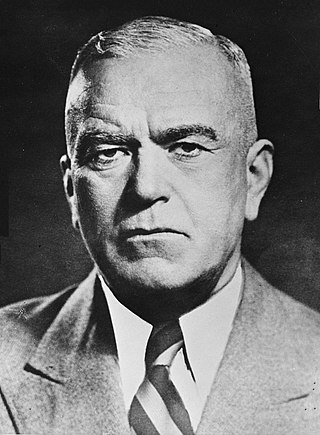Related Research Articles

The National Peasants' Party was an agrarian political party in the Kingdom of Romania. It was formed in 1926 through the fusion of the Romanian National Party (PNR), a conservative-regionalist group centred on Transylvania, and the Peasants' Party (PȚ), which had coalesced the left-leaning agrarian movement in the Old Kingdom and Bessarabia. The definitive PNR–PȚ merger came after a decade-long rapprochement, producing a credible contender to the dominant National Liberal Party (PNL). National Peasantists agreed on the concept of a "peasant state", which defended smallholding against state capitalism or state socialism, proposing voluntary cooperative farming as the basis for economic policy. Peasants were seen as the first defence of Romanian nationalism and of the country's monarchic regime, sometimes within a system of social corporatism. Regionally, the party expressed sympathy for Balkan federalism and rallied with the International Agrarian Bureau; internally, it championed administrative decentralization and respect for minority rights, as well as, briefly, republicanism. It remained factionalized on mainly ideological grounds, leading to a series of defections.

The Kingdom of Romania was a constitutional monarchy that existed in Romania from 13 March (O.S.) / 25 March 1881 with the crowning of prince Karl of Hohenzollern-Sigmaringen as King Carol I, until 1947 with the abdication of King Michael I and the Romanian parliament's proclamation of the Romanian People's Republic.

Petru Groza was an Austro-Hungarian-born Romanian politician, best known as the first Prime Minister of the Communist Party-dominated government under Soviet occupation during the early stages of the Communist regime in Romania, and later as the President of the Presidium of the Great National Assembly from 1952 until his death in 1958.

Ion Mihalache was a Romanian agrarian politician, the founder and leader of the Peasants' Party (PȚ) and a main figure of its successor, the National Peasants' Party (PNȚ).

Constantin Argetoianu was a Romanian politician, one of the best-known personalities of interwar Greater Romania, who served as the Prime Minister between 28 September and 23 November 1939. His memoirs, Memorii. Pentru cei de mâine. Amintiri din vremea celor de ieri —a cross section of Romanian society, were made known for the sharp critique of several major figures in Romanian politics.

Liviu Rebreanu was a Romanian novelist, playwright, short story writer, and journalist.

Ian Keith was an American actor.

The National Theatre Bucharest is one of the national theatres of Romania, located in the capital city of Bucharest.

Virgil Traian N. Madgearu was a Romanian economist, sociologist, and left-wing politician, prominent member and main theorist of the Peasants' Party and of its successor, the National Peasants' Party (PNȚ). He had an important activity as an essayist and journalist, being for long a member on the editorial board for the influential Viaţa Românească.
Nicolae Carandino was a Romanian journalist, pamphleteer, translator, dramatist, and politician.

Brătianu is a family of Romanian politicians, founders of the National Liberal Party (PNL). They are the following:
The German Party was a political party in post-World War I Romania, claiming to represent the entire ethnic German community in the country, at the time it was still a kingdom.

Romanian nationalism is the nationalism which asserts that Romanians are a nation and promotes the cultural unity of Romanians. Its extremist variation is the Romanian ultranationalism.

The National Socialist Party or Steel Shield was a mimetic Nazi political party, active in Romania during the early 1930s. It was led by Colonel Ștefan Tătărescu, the brother of Gheorghe Tătărescu, and existed around the newspaper Crez Nou. One of several far-right factions competing unsuccessfully against the Iron Guard for support, the group made little headway, and existed at times as a satellite of the National-Christian Defense League.
Petre Steinbach, was a Romanian football midfielder and manager.
Duiliu Marcu was a Romanian architect, one of the most well known and prolific of the interwar period. With a career spanning from 1912 to 1966, he is said to have designed 150 public and private projects across Romania, his work reflecting the evolution of local architecture in the first half of the 20th century from French Renaissance, though Neo-Romanian to modernism. Though also designing private villas and apartments, he designed some of the major interwar public buildings in the country, including the Timișoara Theatre, the Elisabeth Palace in Bucharest for the royal family, and the Victory Palace, which now houses the office of the Prime Minister.

The League Against Usury was a single-issue, mainly agrarian, political party in Romania. Formed in late 1929 as a political answer to the Great Depression, it involved itself in the fight against "usury", bringing together politicians on all sides of the political spectrum. Its prominent backers and activists included leftists such as Nicolae L. Lupu and Ion D. Isac, independents such as Pantelimon Erhan, Stefan Frecôt, Dumitru Pavelescu-Dimo, George Tutoveanu and Eraclie Sterian, and some affiliates of the interwar far-right. It also formed a unified cacus with Jean Th. Florescu's Omul Liber faction and with Simion Mândrescu's National-Radicals. The LCC channeled protest votes, and seemed to have gained sweeping popular support during the first year of its existence. It competed in this with fascist movements such as the Iron Guard, ambiguously supporting economic antisemitism—while being generally welcoming of ethnic minorities other than Jewish.

The Vlad Țepeș League, later Conservative Party, was a political party in Romania, founded and presided upon by Grigore Filipescu. A "right-wing conservative" movement, it emerged around Filipescu's Epoca newspaper, and gave political expression to his journalistic quarrels. Primarily, the party supported the return of Prince Carol as King of Romania, rejecting the Romanian Regency regime, and questioning democracy itself. Filipescu stirred public controversy with his critique of democracy, drawing suspicions that he was creating a localized fascism. In its original form, the LVȚ idealized efficient government by dictatorial means, and allowed its fringes to be joined by ultra-nationalists and fascists. One of these was the youth-wing organizer, Gheorghe Beza, expelled from the group in 1930, after his assassination attempt on minister Constantin Angelescu.

Traian Bratu was an Austro-Hungarian-born Romanian scholar of German language and literature. A native of the Mărginimea Sibiului region in present-day Sibiu County, southern Transylvania, he left for the Romanian Old Kingdom, where he attended university, followed up by a doctorate at the University of Berlin.
References
- ↑ FOCUS: 20 de ani de ziare – între idealismul dat de libertate și afacere, în capitalism, 23 dec 2009, mediafax.ro, accesat la 18 septembrie 2010
